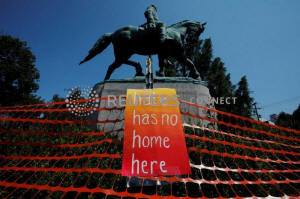|
Trump 'fear-mongering' fuels rise of U.S.
hate groups to record: watchdog
 Send a link to a friend
Send a link to a friend
 [February 21, 2019]
By Katharine Jackson [February 21, 2019]
By Katharine Jackson
WASHINGTON (Reuters) - The number of hate
groups operating in the United States rose 7 percent to an all-time high
last year, the Southern Poverty Law Center said on Wednesday,
attributing the increase largely to anti-immigrant rhetoric from
President Donald Trump.
The SPLC, which has tracked hate groups since 1971, found there were
1,020 operating in the United States in 2018, breaking the 1,018 record
set in 2011. It marked the fourth consecutive year of growth.
The group blamed Trump, whose administration has focused on reducing
illegal and legal immigration into the United States.
"The words and imagery coming out of the Trump administration and from
Trump himself are heightening these fears," Heidi Beirich, director of
the SPLC's Intelligence Project, told reporters on a conference call.
"These images of foreign scary invaders threatening diseases, massive
refugee caravans coming from the south. This is fear-mongering."

The White House has repeatedly rejected charges of bias leveled at
Trump, often citing the effects that a strong economy have had on
minority communities. It did not respond to a request for comment on the
report on Wednesday.
The SPLC defines hate groups as organizations with beliefs or practices
that demonize a class of people. The number of groups has risen 30
percent since 2015 when Trump declared his presidential candidacy.
The last surge in new hate groups came in the early years of Barack
Obama's presidency, a reaction to the first black U.S. president, the
group said. The number rose 9 percent during the first three years of
Obama's administration to reach the prior record then dropped until
2015.
[to top of second column]
|

A sign reading "Hate Has No Home Here" hangs by the statue of Civil
War Confederate General Robert E. Lee, ahead of the one year
anniversary of 2017 Charlottesville "Unite the Right" protests, in
Charlottesville, Virginia, U.S., August 10, 2018. REUTERS/Brian
Snyder

The group also cited online incitement for the rise. Despite efforts
to regulate content on mainstream websites including Facebook, the
internet still provides the most fertile ground for hate groups to
recruit new members, SPLC said.
The non-profit said the growth of hate groups appeared to spur some
who share their ideologies to take violent action. It cited Robert
Bowers, who is accused of killing 11 worshippers at a Pittsburgh
synagogue in October while shouting "All Jews must die."
As part of SPLC's count of hate groups, black nationalist groups
rose 13 percent to 264 in 2018, an increase SPLC attributed to a
backlash against Trump's policies.
Some of the SPLC's targets have criticized the Montgomery,
Alabama-based organization's findings, saying it mislabeled
legitimate organizations.
Earlier this month the founder of the Proud Boys, a self-described
men-only club of "Western chauvinists," sued the center for
defamation. He contended the Proud Boys oppose racism, while the
SPLC said it stood by its research.
(Reporting by Katharine Jackson; Editing by Scott Malone, Tom Brown
and Cynthia Osterman)
[© 2019 Thomson Reuters. All rights
reserved.]
Copyright 2019 Reuters. All rights reserved. This material may not be published,
broadcast, rewritten or redistributed.
Thompson Reuters is solely responsible for this content.
 |